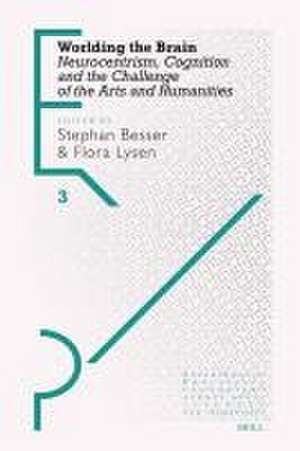Worlding the Brain: Neurocentrism, Cognition and the Challenge of the Arts and Humanities: Experimental Practices, cartea 3
Stephan Besser, Flora Lysenen Limba Engleză Hardback – 4 oct 2023
Preț: 553.02 lei
Preț vechi: 674.43 lei
-18% Nou
Puncte Express: 830
Preț estimativ în valută:
105.85€ • 115.02$ • 88.97£
105.85€ • 115.02$ • 88.97£
Carte indisponibilă temporar
Doresc să fiu notificat când acest titlu va fi disponibil:
Se trimite...
Preluare comenzi: 021 569.72.76
Specificații
ISBN-13: 9789004681286
ISBN-10: 9004681280
Pagini: 275
Dimensiuni: 155 x 235 mm
Greutate: 0 kg
Editura: Brill
Colecția Brill
Seria Experimental Practices
ISBN-10: 9004681280
Pagini: 275
Dimensiuni: 155 x 235 mm
Greutate: 0 kg
Editura: Brill
Colecția Brill
Seria Experimental Practices
Notă biografică
Stephan Besser (PhD University of Amsterdam, 2009), is assistant professor in literary studies and modern Dutch literature at the University of Amsterdam. He is the author of Pathographie der Tropen: Literatur, Medizin und Kolonialismus um 1900 (2013).
Flora Lysen (PhD University of Amsterdam, 2020), is assistant professor in science and technology studies at Maastricht University. She is the author of Brainmedia: One Hundred Years of Performing Live Brains, 1920-2020(2022).
Flora Lysen (PhD University of Amsterdam, 2020), is assistant professor in science and technology studies at Maastricht University. She is the author of Brainmedia: One Hundred Years of Performing Live Brains, 1920-2020(2022).
Cuprins
List of Illustrations
Notes on Contributors
Introduction: Together again, Apart
Stephan Besser and Flora Lysen
1 ‘Worlding’ the Brain through the Cultural Practice of Rhetorical memoria
Michael Burke
2 The Mediated Brain
A Case Study on Experiential Engagement with Cinematic Form
Joerg Fingerhut
3 Getting a Kick out of Film
Aesthetic Pleasure and Play in Prediction Error Minimizing Agents
Mark Miller, Marc Anderson, Felix Schoeller and Julian Kiverstein
4 Transgenerational Trauma and Worlded Brains
An Interdisciplinary Perspective on “Post-Traumatic Slave Syndrome”
Machiel Keestra
5 Beworldered
An Autobiographical Inquiry of Epileptic Being
Trijsje Franssen
6 Pedagogy and Neurodiversity
Experimenting in the Classroom with Autistic Perception
Halbe Kuipers
7 Personification as Élanification
Agency Combustion and Narrative Layering in Worlding Perceived Relations
Marco Bernini
8 Cognitive Formalism
Or, How Presence Machines are Built
Karin Kukkonen
9 “Watchman, What of the Night?”
Reading Uncertainty in Djuna Barnes’s Nightwood
Shannon McBriar
10 The Unfolding Now
Narrative Sense-Making from a Neurocinematic Perspective
Pia Tikka and Mauri Kaipainen
11 Set and Setting of the Brain on Hallucinogen
Psychedelic Revival in the Acid Western
Patricia Pisters
12 Modeling the Model
Reflections on a 10-Year Documentary about the Blue Brain Project
Noah Hutton
13 A Monk in the Office
Mindfulness and the Valuation of Popular Neuroscience
Ties van der Werff
14 Figuring Thought
Between Experience and Abstraction
Ksenia Fedorova
15 Circulating Neuro-Imagery A Trilogue
Antye Guenter, Flora Lysen, and Alexander Sack
16 What Have the Arts and Humanities Ever Done for Us?
Disruptive Contributions and a 4E Cognitive Arts and Humanities
Michael Wheeler
17 Measuring Acoustic Social Worlds
Reflections on a Study of Multi-Agent Human Interaction
Shannon Proksch, Majerle Reeves, Michael Spivey and Ramesh Balasubramania
18 Harmonic Dissonance: Synchron(icit)y
A Case Study of Experimentation at the Intersection of the Arts and Sciences
Suzanne Dikker and Suzan Tunca
19 Thanks for Sharing
Local Worlds, Xeno-Patterning, and Predictive Processing
Stephan Besser
Index
Notes on Contributors
Introduction: Together again, Apart
Stephan Besser and Flora Lysen
Part 1: Worlded Brains
1 ‘Worlding’ the Brain through the Cultural Practice of Rhetorical memoria
Michael Burke
2 The Mediated Brain
A Case Study on Experiential Engagement with Cinematic Form
Joerg Fingerhut
3 Getting a Kick out of Film
Aesthetic Pleasure and Play in Prediction Error Minimizing Agents
Mark Miller, Marc Anderson, Felix Schoeller and Julian Kiverstein
4 Transgenerational Trauma and Worlded Brains
An Interdisciplinary Perspective on “Post-Traumatic Slave Syndrome”
Machiel Keestra
5 Beworldered
An Autobiographical Inquiry of Epileptic Being
Trijsje Franssen
6 Pedagogy and Neurodiversity
Experimenting in the Classroom with Autistic Perception
Halbe Kuipers
Part 2: Narrative Entanglements
7 Personification as Élanification
Agency Combustion and Narrative Layering in Worlding Perceived Relations
Marco Bernini
8 Cognitive Formalism
Or, How Presence Machines are Built
Karin Kukkonen
9 “Watchman, What of the Night?”
Reading Uncertainty in Djuna Barnes’s Nightwood
Shannon McBriar
10 The Unfolding Now
Narrative Sense-Making from a Neurocinematic Perspective
Pia Tikka and Mauri Kaipainen
Part 3: Figuring the Brain
11 Set and Setting of the Brain on Hallucinogen
Psychedelic Revival in the Acid Western
Patricia Pisters
12 Modeling the Model
Reflections on a 10-Year Documentary about the Blue Brain Project
Noah Hutton
13 A Monk in the Office
Mindfulness and the Valuation of Popular Neuroscience
Ties van der Werff
14 Figuring Thought
Between Experience and Abstraction
Ksenia Fedorova
PART 4: Shared Patterns and Discordant Worlds
15 Circulating Neuro-Imagery A Trilogue
Antye Guenter, Flora Lysen, and Alexander Sack
16 What Have the Arts and Humanities Ever Done for Us?
Disruptive Contributions and a 4E Cognitive Arts and Humanities
Michael Wheeler
17 Measuring Acoustic Social Worlds
Reflections on a Study of Multi-Agent Human Interaction
Shannon Proksch, Majerle Reeves, Michael Spivey and Ramesh Balasubramania
18 Harmonic Dissonance: Synchron(icit)y
A Case Study of Experimentation at the Intersection of the Arts and Sciences
Suzanne Dikker and Suzan Tunca
19 Thanks for Sharing
Local Worlds, Xeno-Patterning, and Predictive Processing
Stephan Besser
Index


